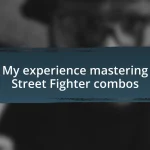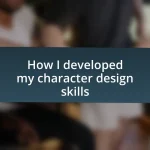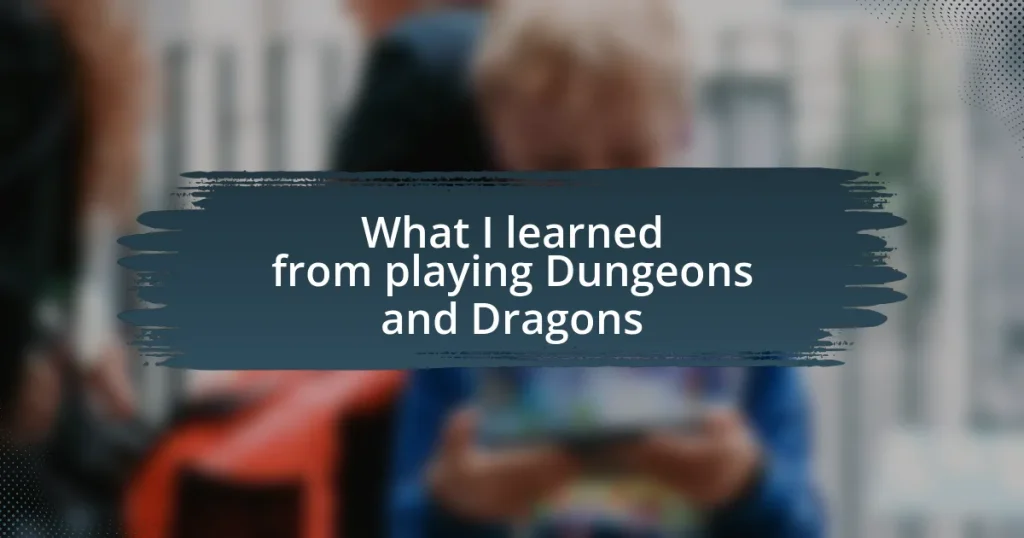Key takeaways:
- Dungeons and Dragons fosters teamwork through open communication, mutual respect, and trust, enhancing collaboration skills.
- Engagement in D&D promotes creativity and imaginative thinking as players contribute unique ideas to the narrative.
- The game develops strategic thinking by encouraging players to weigh risks and plan their actions carefully.
- Character development in D&D enhances empathy and understanding of diverse perspectives, influencing real-world interactions.
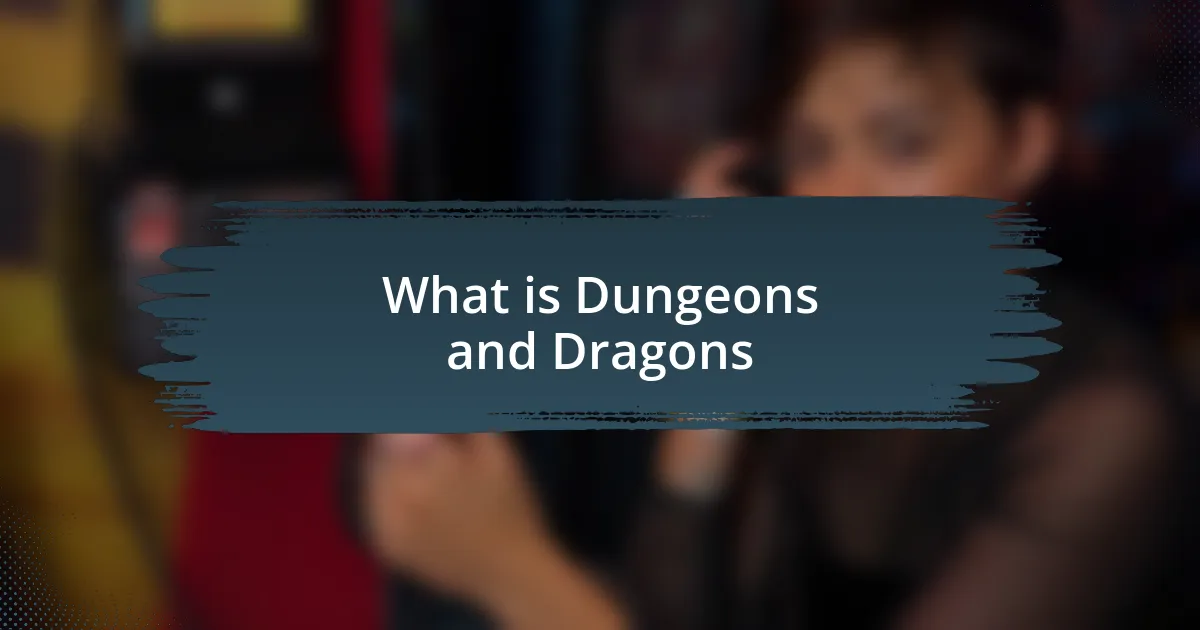
What is Dungeons and Dragons
Dungeons and Dragons, often abbreviated as D&D, is a tabletop role-playing game where players create characters and embark on adventures in a rich fantasy world. I remember the first time I rolled my character’s stats; I felt a rush of excitement mixed with uncertainty. What could this character become? The sheer possibility of exploring different narratives and building relationships with other players was exhilarating.
At its core, D&D is about storytelling and collaboration. Players gather around a table—whether in person or online—and immerse themselves in a shared narrative led by a Dungeon Master (DM). The DM weaves the world, presenting challenges and plots that require teamwork to navigate. I still think about the moments when we strategized together, laughing and brainstorming solutions. Did you ever find yourself completely lost in a narrative, where the line between fantasy and reality blurs?
The game encourages improvisation, creativity, and critical thinking as players make choices that impact the story. I’ve learned that every session can take unexpected turns; sometimes, the most memorable moments arise from spontaneous decisions. Isn’t it fascinating how a simple roll of the dice can lead to thrilling triumphs or dramatic failures? These experiences not only forge unforgettable memories but also teach valuable lessons about resilience and teamwork.
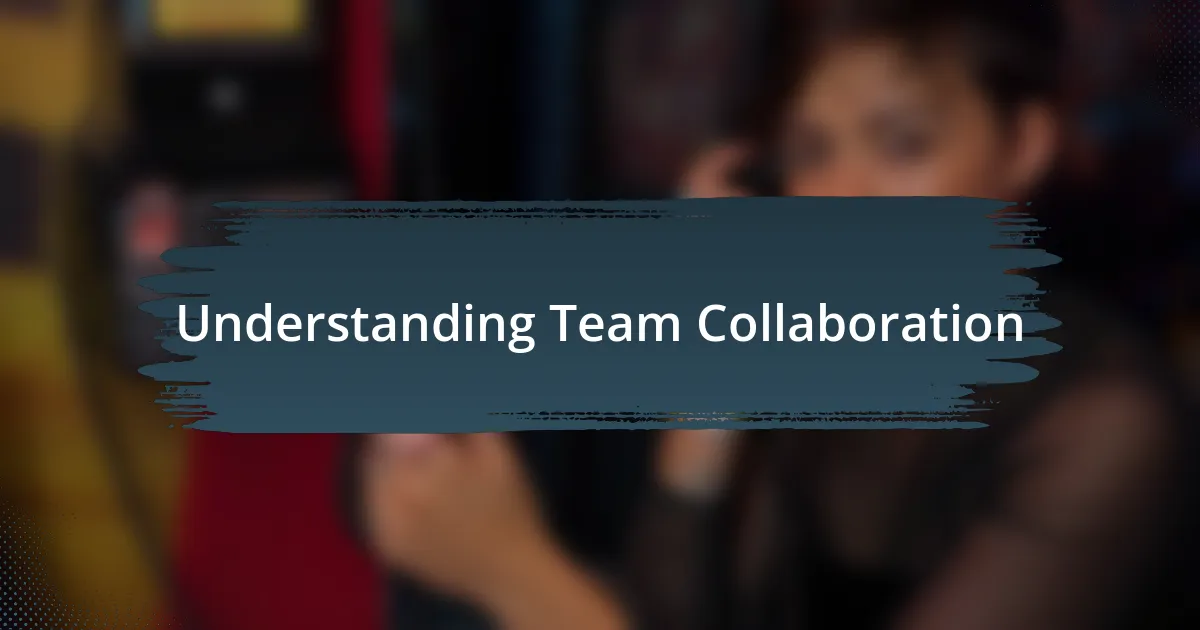
Understanding Team Collaboration
Understanding Team Collaboration
Engaging in Dungeons and Dragons has profoundly shaped my understanding of teamwork. During one session, our group faced a challenging enemy that seemed unbeatable. We spent a considerable amount of time brainstorming strategies, each player’s input shaping our approach. It was a powerful reminder that collaboration often leads to the best solutions, even when we’re under pressure.
Here are some key aspects I’ve learned about effective team collaboration through D&D:
- Open communication is crucial; sharing ideas fosters creativity.
- Respecting each player’s strengths can enhance the whole group’s effectiveness.
- Adapting to each other’s play styles builds stronger team dynamics.
- Compromise can lead to unexpected and delightful narrative twists.
- Trust among team members is essential for taking risks in the game.
I still remember the moment we unexpectedly turned the tide of battle. It left me with a sense of camaraderie; it was more than just victory; it was about how we got there together.
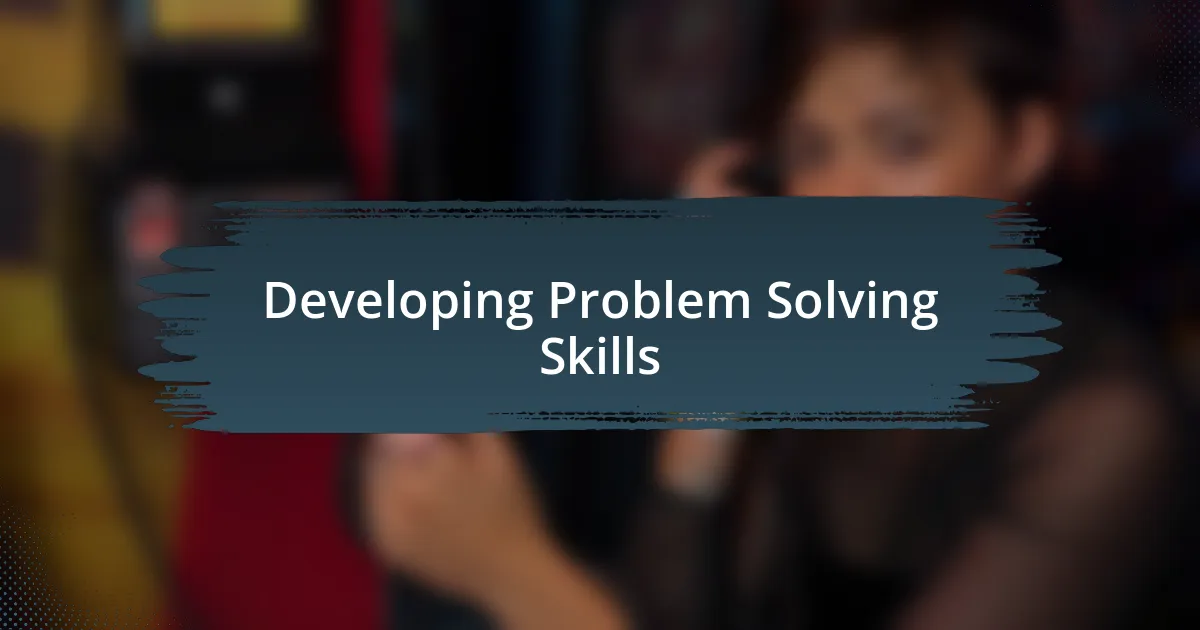
Developing Problem Solving Skills
When facing complex challenges in Dungeons and Dragons, I quickly learned that effective problem solving is a team effort. In one memorable session, our party was trapped in a labyrinthine dungeon with only one way out. As ideas flowed, we dissected our options, weighing the potential consequences of each choice. It was exhilarating to see how our different perspectives created a tapestry of strategies that ultimately led us to safety.
Through these experiences, I’ve recognized that problem-solving isn’t just about finding a solution; it’s about embracing creativity and encouraging divergent thinking. In another game, we had to negotiate with a cunning dragon to gain access to a treasure. Every player’s unique expertise led us to brainstorm unconventional approaches, which not only made the encounter memorable but also helped us think outside the box. I always felt our conversations were like puzzle pieces coming together, where every input was vital in completing the picture.
As we navigated these thrilling dilemmas, it became evident that flexibility is key in problem-solving. I recall a situation where our initial plan went awry, forcing us to adapt quickly and redeploy our tactics. That moment was both stressful and exciting, showcasing how unexpected twists can spark innovative solutions when we remain open to change. D&D taught me that real-life challenges often require the same agility and willingness to pivot for success.
| Key Skills Developed | Description |
|---|---|
| Creative Thinking | Encouraging out-of-the-box solutions during gameplay. |
| Team Collaboration | Working together to combine different ideas for robust strategies. |
| Flexibility | Adapting plans in response to unforeseen circumstances. |
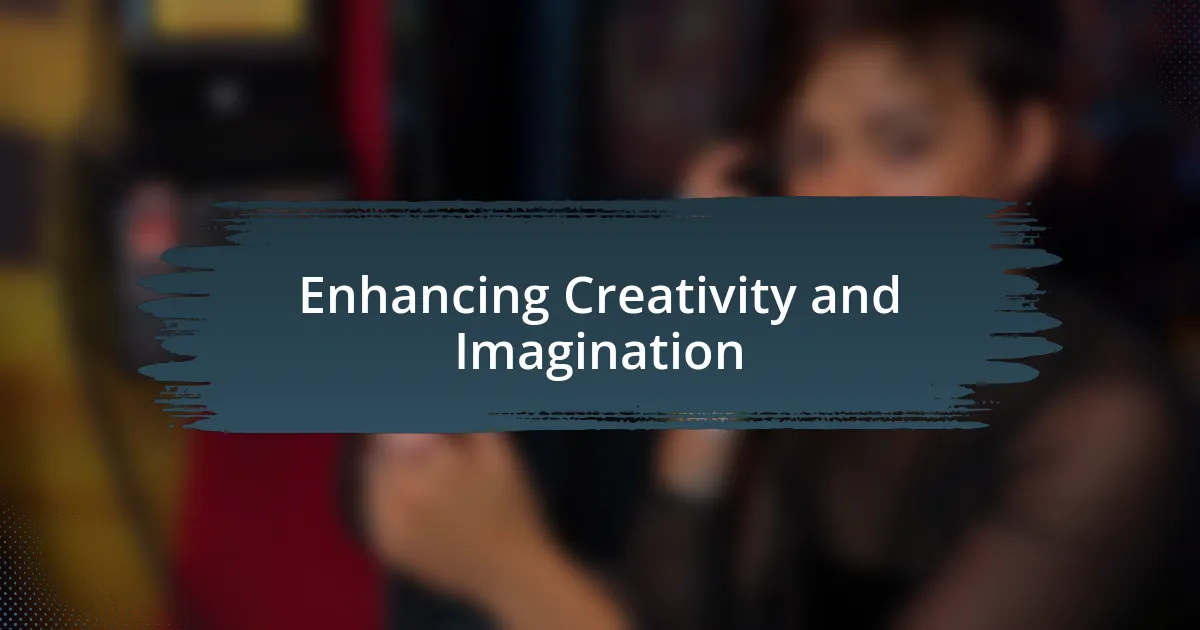
Enhancing Creativity and Imagination
When I first rolled my character, a whimsical bard with an affinity for storytelling, I didn’t realize how deeply it would immerse me in creativity. Each game session felt like stepping into an ever-expanding universe where my imagination was the limit. Have you ever considered how crafting a backstory can influence gameplay? Every detail I added opened new avenues for creativity, not just for myself but for everyone at the table.
One particularly enchanting episode involved my bard serenading a fierce troll to pacify it. Initially, it felt like a ridiculous concept, but my friends’ faces lit up with laughter and intrigue when I described the scene. As I rolled the dice and our fates intertwined, I felt a rush of excitement knowing that we could collectively shape the narrative. This spontaneous collaboration sparked a rush of creativity that transformed the game into a vivid tapestry of ideas and emotions.
Moreover, I found that imagination flourished when I least expected it. In a session, I faced an impromptu need for a vivid description of a mystical forest. As I conjured up images of glowing flora and enchanting sounds, I could see my friends’ expressions change, as they too became part of the landscape. It made me realize just how powerful our collective creativity can be, encouraging everyone to dive in and contribute their unique visions to the shared experience. What other experiences can transform mundane moments into extraordinary adventures? In Dungeons and Dragons, the answer is always hidden in the heart of our imaginative pursuits.
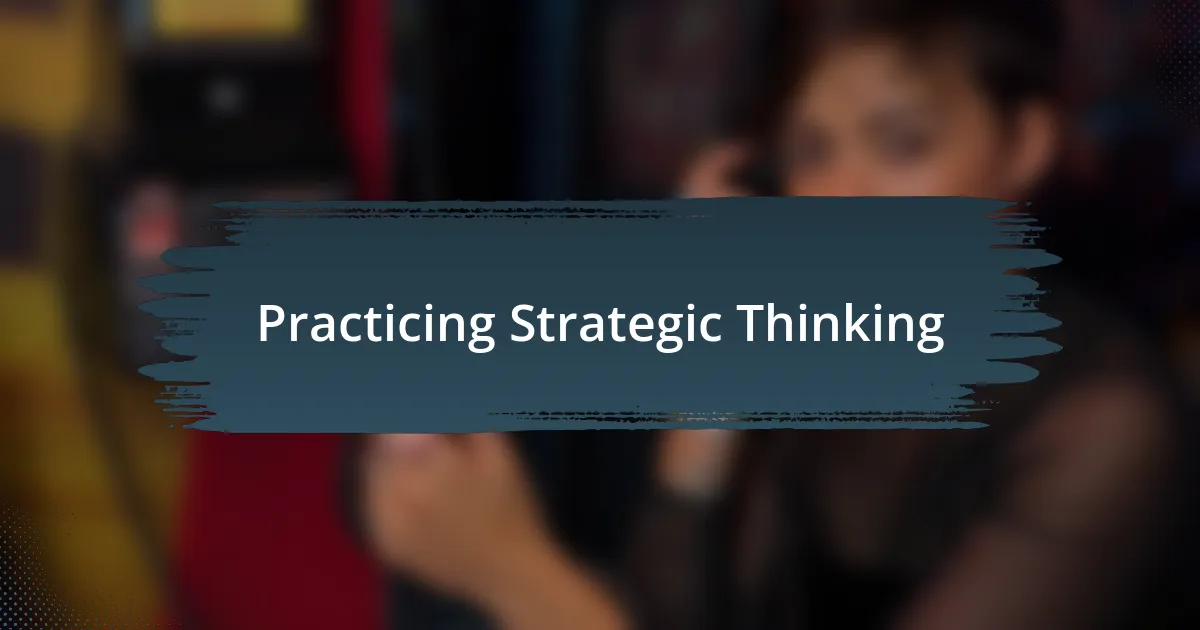
Practicing Strategic Thinking
Practicing strategic thinking in Dungeons and Dragons can be a game-changer for every player. I vividly recall a tense battle where my team found itself cornered by a band of marauding goblins. In that moment, I realized the importance of planning our moves carefully. Instead of charging headfirst into the fray, we huddled together to develop a strategy that utilized our character strengths efficiently. This collective brainstorming not only saved our party but also deepened my appreciation for the power of thoughtful decision-making.
Another experience that stands out involved navigating a complex dungeon filled with traps and puzzles. As we chose our path, I noticed how each decision, no matter how small, could lead to unexpected challenges. I learned to evaluate risks and rewards carefully, weighing my options before making a move. This process taught me to approach problems with a calm mindset and a strategic focus, skills that extend far beyond the tabletop and into everyday life. Isn’t it interesting how D&D teaches us to think several steps ahead, much like playing a game of chess?
Participating in these sessions has truly enhanced my ability to anticipate my opponents’ tactics while also considering how my actions affect the entire group. During one particular campaign, I remember feeling a rush of adrenaline as I outmaneuvered an enemy with a well-timed spell. That moment highlighted how strategic foresight can turn the tide of a game. If we take a step back, can we see how these experiences reflect our approaches to real-world challenges? I find that each strategic encounter not only sharpens my problem-solving skills but also fosters a sense of teamwork and collaboration that resonates well beyond the game itself.
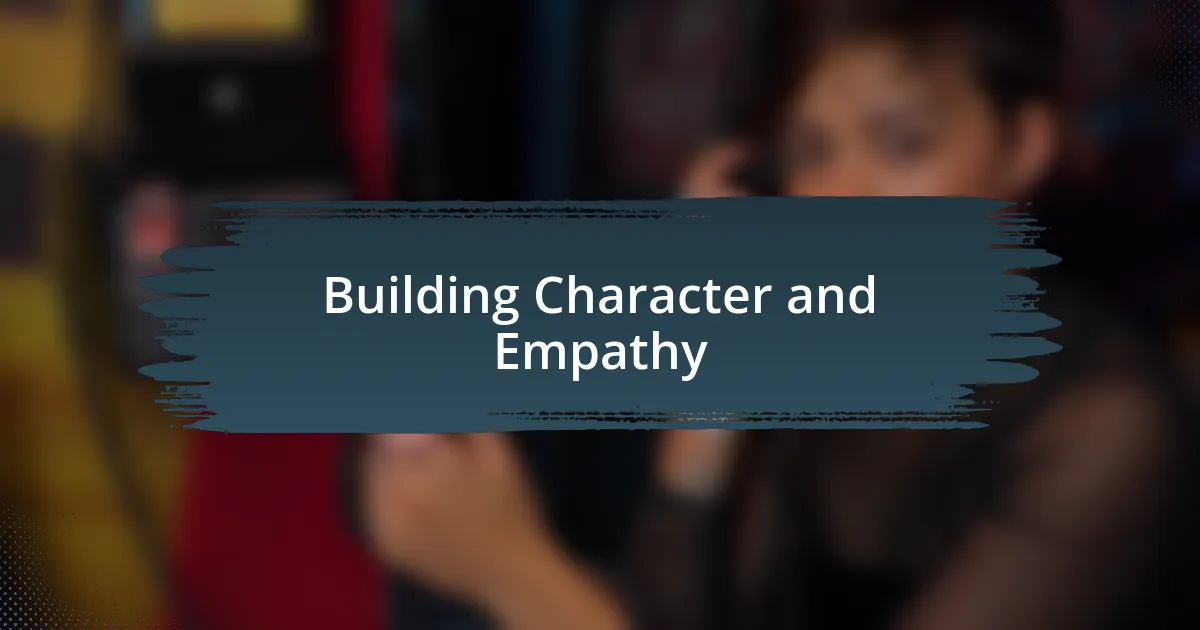
Building Character and Empathy
Immersing myself in Dungeons and Dragons has profoundly shaped my understanding of character and empathy. One memorable session involved crafting a backstory for my character, a once-revered knight who had fallen from grace. As I fleshed out his regrets and aspirations, I felt a wave of empathy not just for my character but for those who have faced similar struggles in life. It made me wonder, how often do we take the time to understand the stories of others around us?
Through these narratives, I’ve learned that every character, even the antagonistic ones, has their motivations and fears. In one campaign, I found myself facing an enemy who was driven by a desperate need to protect their family. Rather than seeing them solely as a threat, I began to appreciate their perspective, which led to a richer, more meaningful confrontation. This shift in mindset has encouraged me to approach real-world conflicts with a more compassionate lens, fostering connections that I may have overlooked before.
Moreover, D&D regularly allows moments for character interactions, which serve as a powerful reminder of the importance of listening and understanding. I recall a poignant conversation between my character and a fellow player’s rogue, where we shared our fears and values during a quiet moment by the campfire. This experience reminded me that building relationships requires vulnerability and honesty. Isn’t it fascinating how fiction can teach us about the nuances of human connection, guiding us to be more empathetic individuals in our everyday lives?

